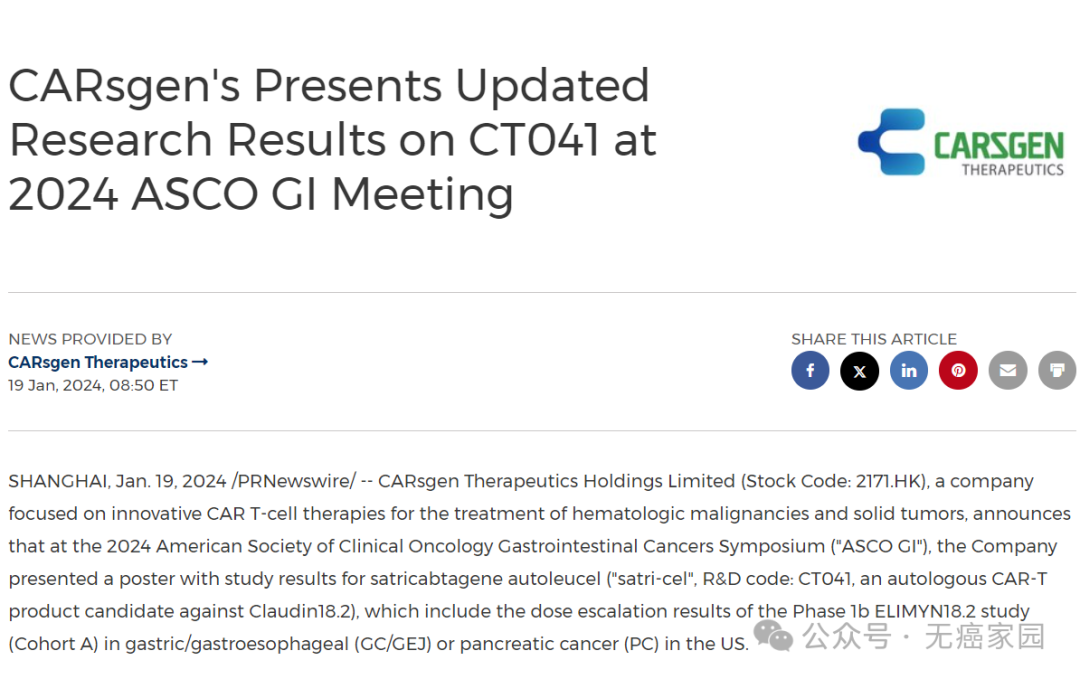Breaking News: Another Milestone for Domestic CAR-T Therapy! Clinical Benefit Rate Reaches 71.4% in CT041 Trials, Challenging Gastric and Pancreatic Cancers with Astonishing Results!
🎉 Breaking News: Another Milestone for Domestic CAR-T Therapy! Clinical Benefit Rate Reaches 71.4% in CT041 Trials, Challenging Gastric and Pancreatic Cancers with Astonishing Results! 🚀

Gastric Cancer, Pancreatic Cancer
A burgeoning therapeutic target for gastric cancer—Claudin 18.2, its discovery has also opened a new chapter in targeted therapy for gastric cancer. If we talk about the hottest cell immunotherapy in recent years, it has to be chimeric antigen receptor T-cell (CAR-T) therapy. Based on this, Chinese researchers have developed the world’s first CAR-T cell therapy targeting Claudin18.2—CT041.
CT041, as the first CAR-T cell therapy targeting Claudin18.2, made its debut at the 2019 ASCO Annual Meeting. Among 12 patients with metastatic adenocarcinoma (7 gastric cancer, 5 pancreatic cancer) treated with Claudin18.2-targeting CAR T-cell therapy, no severe adverse events, treatment-related deaths, or serious neurotoxicity were reported. Among the 11 evaluated patients: 1 (gastric adenocarcinoma) achieved complete remission; 3 (2 gastric adenocarcinoma, 1 pancreatic adenocarcinoma) achieved partial remission; 5 had stable disease; and 2 experienced disease progression. The overall objective response rate was 33.3%.
At the 2024 American Society of Clinical Oncology Gastrointestinal Cancers Symposium (ASCO GI) held on January 19, 2024, SciGen showcased a clinical study of Claudin18.2-targeting autologous CAR-T cell therapy CT041 (satri-cel), reporting results from the dose escalation phase of the ELIMYN18.2 1b clinical trial conducted in the United States for the treatment of gastric/esophagogastric junction adenocarcinoma (GC/GEJ) or pancreatic cancer (PC).
This single-arm, open-label phase 1b/2 study primarily evaluated the safety and efficacy of CT041 in patients with advanced Claudin18.2-positive gastric/esophagogastric junction adenocarcinoma (GC/GEJ, progressing after at least second-line treatment or intolerant) or pancreatic cancer (PC, progressing after at least first-line treatment or intolerant).
Nineteen patients (9 GC/GEJ patients, 12 PC patients) received CT041 treatment at doses ranging from 250 to 600×106 cells: dose 1: 250-300×106 (n=6), dose 2: 375-400×106 (n=6), dose 3: 600×106 (n=7). All patients had received systemic therapy, with 85.7% of GC/GEJ patients and 58.3% of PC patients receiving ≥3 lines of systemic therapy. The median number of metastatic organs for all patients was 2, with at least one prior infusion. Clinical benefit rate included complete remission [CR], partial remission [PR], and stable disease [SD] ≥180 days.
As of September 15, 2023, with a median follow-up of 8.9 months, across all dose groups, the confirmed objective response rate (ORR) for gastric/esophagogastric junction adenocarcinoma patients was 42.9% (3/7); clinical benefit rate (CBR) was 57.1% (4/7); median progression-free survival (mPFS) and median duration of response (mDOR) were 5.7 months and 6.9 months, respectively. Additionally, the median overall survival (mOS) for gastric/esophagogastric junction adenocarcinoma or pancreatic cancer patients was 8.9 months. In dose level 3 (DL3), one gastric/esophagogastric junction adenocarcinoma patient achieved complete remission (CR). The clinical benefit rate for gastric/esophagogastric junction adenocarcinoma or pancreatic cancer patients was 71.4% (5/7), with a median OS of 12.9 months.
In summary, #CT041, as the first autologous #Claudin182 CAR-T cell therapy, demonstrates encouraging safety and shows promising preliminary efficacy in Claudin18.2-positive advanced GC/GEJ and PC patients who have received multiple prior treatments.
You can send electronic copies or photos of genetic testing reports and diagnostic reports to the email address: doctor.huang@globecancer.com, or click on the WhatsApp+8613717959070 icon on the homepage. The Medical Department will contact you as soon as they receive the reports.
🌟 #CART #Immunotherapy #CT041 #CancerResearch #ClinicalTrials #GastricCancer #PancreaticCancer #SciGen #ASCOGI2024
